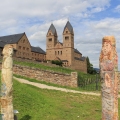In a world where authoritarianism is on the rise, promoting human rights is a priority. Understanding and advocating for human rights gives individuals and communities the power to stand up against injustice. But awareness is still pretty low.
A survey by Human Rights Educators USA found that only 8% of Americans know the Universal Declaration of Human Rights. This lack of knowledge makes it harder to protect fundamental freedoms and dignity around the world.
ISHR, the International Solidarity for Human Rights, was set up in 2008 by Devorah Sasha and Elizabeth Sánchez-Vegas. They saw a need for better ways to share information about human rights, so they started working to make human rights education more accessible and understandable to people of all ages and backgrounds.
The goal of the organization is to create a culture of respect and human rights awareness around the globe by engaging communities in activities that highlight the importance of human rights in our daily lives.
Sasha and Sánchez-Vegas saw the Primitive Way of the Camino de Santiago as the perfect symbol to promote human rights. Thanks to their efforts, the oldest of all pilgrimage routes to Santiago is now also an educational itinerary that promotes a fundamental text we are all somewhat familiar with –although we scarcely know its contents.
Pilgrims who walk along this ancient Jacobean route walk will find 30 different plaques –15 of them in Asturias and 15 more in Galicia. The plates are each designed by the Spanish Pop artist Eladio de Mora (dEmo), and have their own certificate of authenticity. Each one features one of the thirty articles of the Universal Declaration of Human Rights.
The first fifteen plaques are located in Oviedo, Grado, Salas, Tineo, Pola de Allande and Grandas de Salime. The remaining fifteen are in A Fonsagrada, Baleira, Castroverde, Lugo, Guntín, Melide, Arzúa, O Pino and Santiago de Compostela. All of them are carefully placed in emblematic buildings, pilgrims’ hostels, chapels, and other Compostelan landmarks and milestones.
The ISHR is convinced that what they did with the Primitive Way can also work be done with other pilgrimage routes around the world. This journey is not just about getting from A to B –namely, from Oviedo to Compostela. It is also about learning, thinking through, and sharing universal human values: dignity, justice, equality. The more this experience is shared, the sooner a global conversation on human rights, respect, fraternity, and cooperation can be started.




